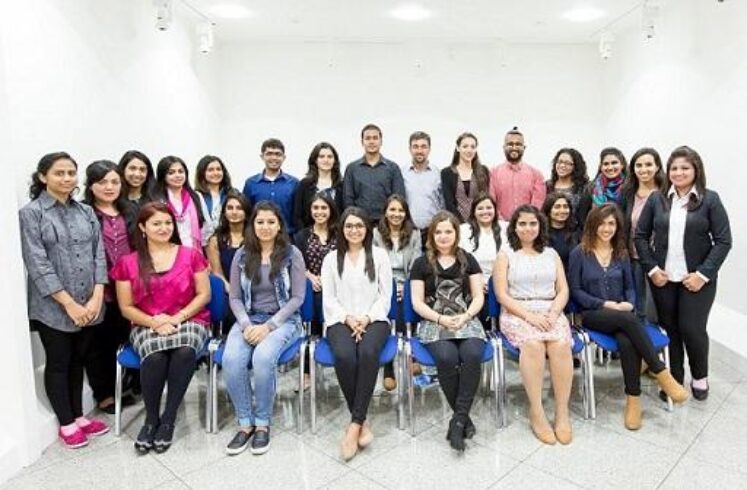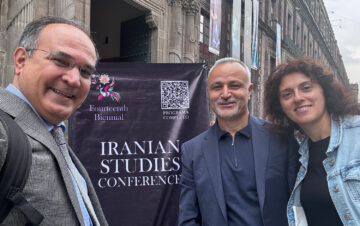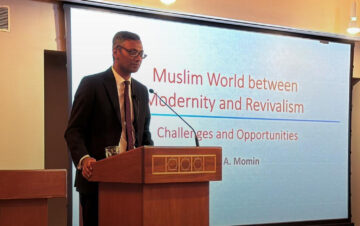The IIS recently welcomed new students onto the Secondary Teacher Education Programme (STEP) and the Graduate Programme in Islamic Studies and Humanities (GPISH). Arriving from across the globe, twenty-six students joined STEP from Canada, India, Kenya, Pakistan, Tajikistan, Tanzania and the USA, whilst twelve students from India, Norway, Pakistan, Tajikistan, and the USA began GPISH.
Dr Laila Halani, Head of the Department of Graduate Studies, expressed her aspirations for the incoming students:
These thirty eight students from eight countries have embarked on a systematic study of their heritage with scholars and researchers contributing to the latest developments to the field of Islamic studies, with a particular focus on Shi‘i Studies and Qur’anic studies. This life changing journey will be enriched for GPISH students through their Master’s in diverse fields of study and disciplines at leading UK Universities. STEP students will benefit from their interactions with leading educationists at UCL Institute of Education from where they will receive an MA Education and MTeach. As this journey takes them to uncharted and challenging territories, they will have the opportunity to learn as much from each other as from the scholars and educators who will guide them in their journey.
STEP is a joint initiative between the IIS and the UCL Institute of Education, which adopts a broad interdisciplinary approach to train secondary level teachers in the field of Islamic studies and religious studies. STEP prepares students to deliver the Institute’s Secondary Curriculum – which has been specifically developed for the religious and humanities education of Ismaili Muslim children. Having qualified as secondary-level teachers, the graduates will go on to undertake teaching positions with the Ismaili Tariqah and Religious Education Boards in their home countries. Monisha Poonawala, who joins this year’s STEP cohort from India, commented:
The Secondary Teacher Education Programme is a great opportunity for aspiring teachers like me who plan to upgrade both their knowledge base as well as teaching skills and pedagogical approaches. Through this intensive course of two years I am looking forward to equip myself well, so that I am able to play an active role and be an integral part of the RE setting in my home country. One of the most exciting features of this programme is the diversity of the students in terms of their cultures, nationalities, languages and professional backgrounds. This makes it a melting pot which serves as an amazing platform for learning and development from much wider perspectives and its application in each of our home contexts.
GPISH is a three-year graduate programme, the first two years act as preparation for a research degree and a stepping stone to a variety of career opportunities. Past graduates have pursued careers in a wide range of fields, including academia, media, education and development. New students will have the unique opportunity to benefit from the new GPISH curriculum which was designed to ensure that GPISH continues to be a cutting edge programme in the field of Islamic Studies and Humanities, while remaining true to the original vision that guided its launch twenty two years ago. Introduced in September 2014, the new curriculum benefits from recent scholarship and methodological approaches, particularly in the field of Shi‘i and Ismaili studies. In keeping with the interdisciplinary nature of the programme, there are thematic and methodological integrations between the modules.
Malika Bhola from the USA, who joins this year’s GPISH cohort, said:
I am excited to now have the opportunity to be a part of a programme like GPISH that embodies the very essence of wholesome Islamic education, and that will give me a chance to explore the fusion between modern ideas and ancient beliefs. I believe that through its strong emphasis on academic diversity and collective learning, the IIS will condition me for all upcoming professional challenges in the field of humanities. The renowned faculty and broad-based curriculum of GPISH will help me cultivate a global perspective necessary to maintain effective entrepreneurship. Its challenging environment will not only provide me with opportunities to exploit my true academic potential, but also enhance my desire to serve my community.
Visit the Graduate Programme







